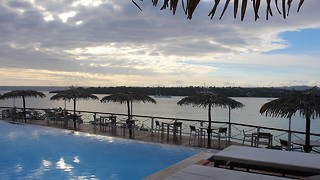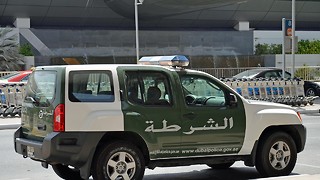Tales from the Middle East
Cambridge Arabic students tell us how Westerners were perceived during their year in the Middle East

Jennie King in Cairo, Egypt
Cairo, like many urban hubs, is a city of contradictions. The leafy, latte-frothed suburbs of Maadi and Zamalek are incongruous neon patches in the grey-red quilt of its poorer districts. They serve as a welcome retreat for expats and the ‘liberal’ upper class and highlight a bizarre disconnect in the country’s relationship with the West.
The majority of Egyptians I met were willing to fight (and die) for an idea of Egypt that they could neither verbalise nor see reified in their day-to-day surroundings. Recent political events reflect this belief in a "better Egypt", which can at last cast off the oppressive Western yoke.
A century of perceived political oppression by France, Britain and America, as well as a range of overt (though under-documented) social abuses in the form of sex tourism, child bride trafficking and exploitation has led to universal distrust,
On the other hand, any 20 to 30 year old above a certain financial threshold is desperate to emigrate, usually in a Union Jack/Stars-and-Stripes direction. Many Egyptian landlords will ban their western tenants from having local visitors, partly for fear of ethnic orgies, but partly because “they always cause trouble and steal things.”
For a country that places unrelenting faith in the national ideal, it remains fixated on prosperity overseas; for a society built of the tenets of Islam, people are only too keen to call each other thieves, liars and perverts, and extol the virtue of infidel expats.

Pete Teverson in Amman, Jordan
In terms of foreign policy Jordan has always adopted a firmly pro-Western stance. The 1994 Washington Agreement saw King Hussein open up diplomatic and trade agreements with Israel, becoming only the second Arab nation to recognise Israel's sovereignty after Egypt.
On the ground, the situation is more complicated. Jordan’s population is estimated at around six million, of which nearly a third are Palestinian refugees, and a further two million are of Palestinian descent. Add to that up to a million Iraqi refugees since the 2003 war, and 500,000 Syrians in the last two years (although the Minister for Media puts the unofficial figure closer to one million), and it is easy to see why the government position might not reflect the general will. For the majority, the US will always be Israel’s great legitimiser, with most taxi drivers telling you all about how America is controlled by a secretive Zionist faction.
There is growing resentment from Jordanian citizens, who have been bearing the brunt of severe austerity measures, at the idea that the government’s foreign interests are now acting against the interests of the people. Understandably perhaps, when Western relations have resulted in £87m in aid from the UK, $200m from the US and $150m from the World Bank for Syrian refugees, whilst fuel and household gas prices have gone up 50 per cent and electricity 15 per cent (now 10 times more expensive than Egypt, 20 times more than Saudi Arabia). 13 per cent are living below the poverty line.
That being said, this resentment is not manifesting in violent resistance – peaceful demonstrations go on in downtown Amman every few weeks and in some rural governorates, but the feeling is not of a country on the edge of revolution.
These next few weeks could be crucial for Jordan as the US and its allies determine their course of action in Syria. Despite vowing neutrality, Jordan will not escape the consequences of international action in Syria, and if King Abdullah II's allegiance to the US is held to blame, there are factions in Jordan ready to pounce.

Enrico Boccaccini in Bethlehem, West Bank
If you are someone who calls the Middle East home, rather than a student who can leave the region after six months, you watch the news with more preoccupation than curiosity. Even more so, if you are part of a minority and you feel that every conflict in the region threatens your existence.
The Palestinian Christians who hosted me during my year abroad, belong to one of the many religious minorities in the Middle East that come under attack every time an Arab state is shaken by major unrest.
When discussing the latest developments with Palestinian Christians I was constantly confronted with their consternation over the West's support for the Syrian rebels, who reportedly rape and kill Syrian Christians. I was asked why the West has forgotten its Christian brothers in the Middle East. Why does the West fuel violence by supporting terrorism and giving weapons to Islamic fundamentalists? Why does the West remove such stable regimes like those of Assad and Saddam Hussein, who are secular, protect minorities, and promote modern education? These questions being rhetorical in nature, my hosts promptly provided me with answers: The West wants to destabilise the Middle East and weaken the Arabs for their oil, the creation of economic dependency, and Israel's safety... And the lives of Christian and Muslim minorities is a price the West is ready to pay to achieve these goals.
None of the Palestinian Christians I spoke with denied the fact that Assad is a relentless dictator. But when violent protests break out in the Middle East for whatever motive, it becomes a matter of life and death for the local minorities.
Jess McArdle in Judaida near Acre, Israel
"Don’t you have a camera?" Something I was often asked in the village of Judaida. I did, but it was one of those half-camera half-camcorders and I felt like a documentary filmmaker when I took it out. I was one of the only people my age who didn’t have a smart phone and my hands always felt idly bare. At weddings just as many iPhones as hands were waved in the air, and even when we received guests my peers were chatting or playing games in their laps.
When Fatima, the mother I was living with, would cook, I would ask countless times for the names of every single ingredient, every step of the process and every object in the kitchen, carefully noting them down in a book that I carried everywhere with me. I pronounced Arabic words strangely, my sentence structure was all wrong.
Where is that golden ratio of observer-participant in life? Why didn’t I have a camera? Why was I so shy to be the observer that my fastidious note-taking and naïve interest in the most daily of chores belied? I began teaching Fatima English, watching as she wrote down the words in a script that made no differentiation between the capitals and the small letters. Watching her, watching me, as I tried my best to teach, I cannot even begin to imagine what she saw. It’s a shame she didn’t capture it on her iPhone.
 News / Academics lead campaign against Lord Browne Chancellor bid2 July 2025
News / Academics lead campaign against Lord Browne Chancellor bid2 July 2025 News / Lord Mandelson visits University30 June 2025
News / Lord Mandelson visits University30 June 2025 Features / 3am in Cambridge25 June 2025
Features / 3am in Cambridge25 June 2025 News / Clare students call on College to divest3 July 2025
News / Clare students call on College to divest3 July 2025 News / John’s students call on College to divest1 July 2025
News / John’s students call on College to divest1 July 2025







